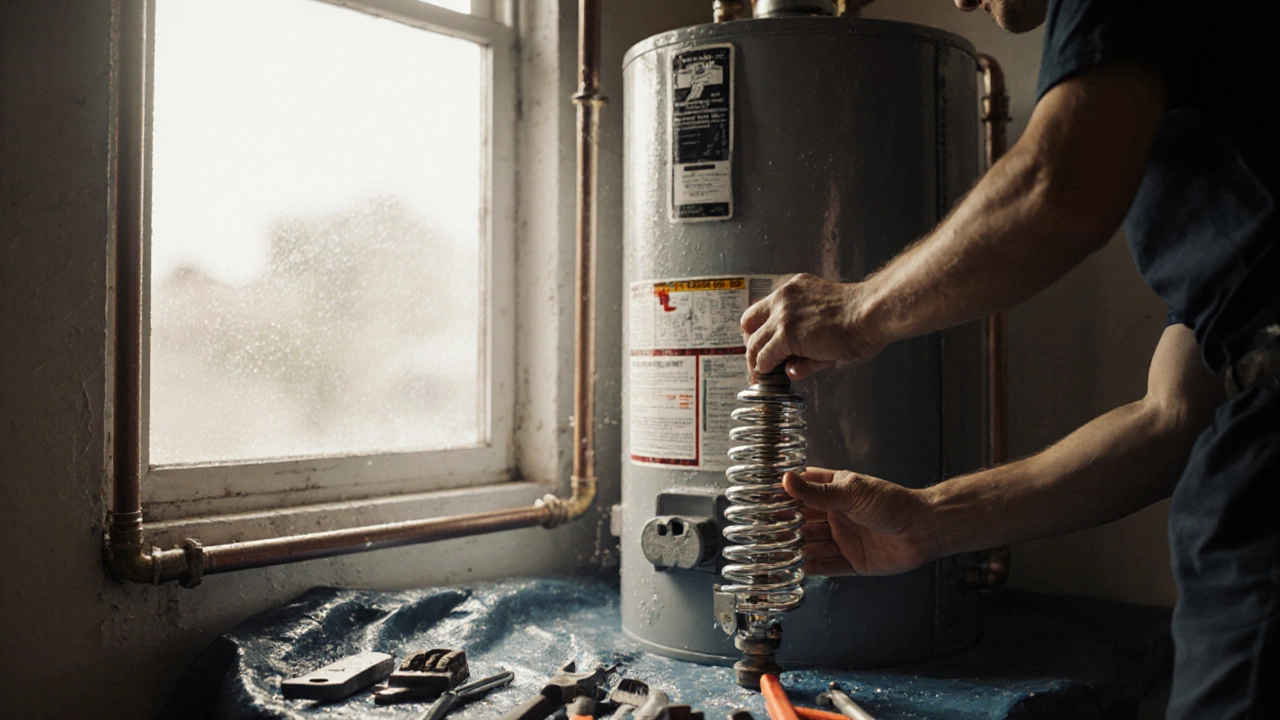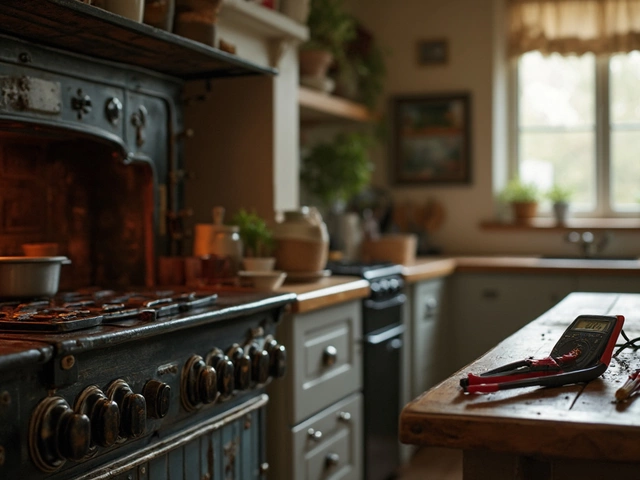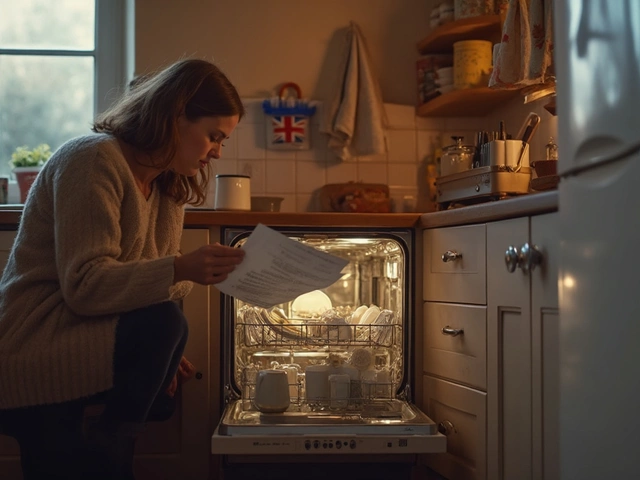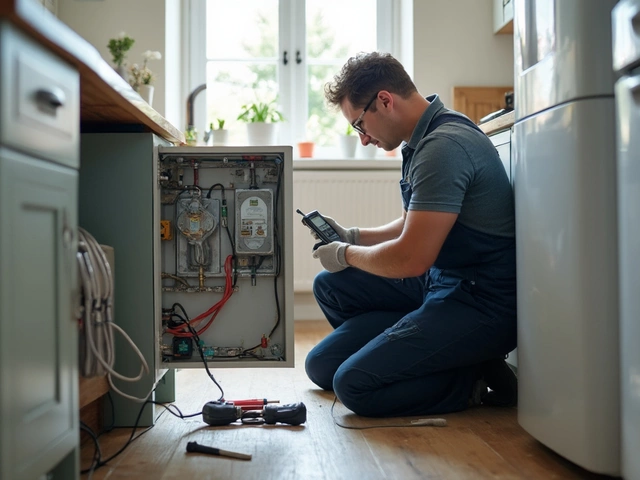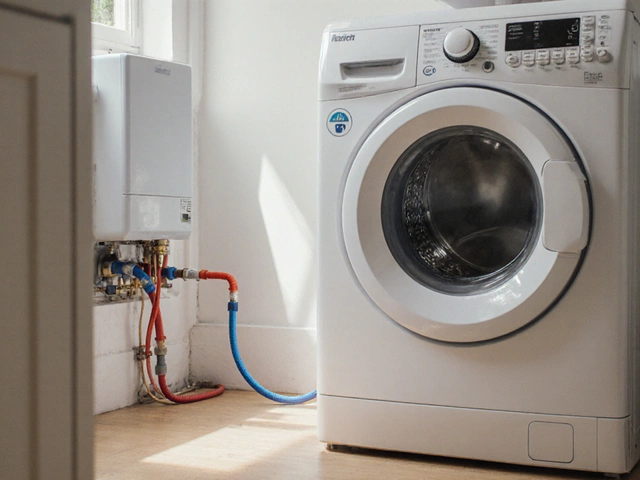Water Heater Repair Time Calculator
Estimate Your Repair Time
Estimated Repair Time
Select your heater type and factors to see estimate
Urgent Warning
Call a plumber immediately if you see water pooling around the base, smell gas, or hear loud noises. These are safety risks requiring same-day service.
When your hot water heater stops working, you don’t just lose warm showers-you lose routine. Kids can’t wash their hair before school. Dishes pile up. Laundry stalls. And if it’s winter in Auckland, cold showers feel like punishment. So the real question isn’t just how long it takes to fix a hot water heater-it’s how fast you can get back to normal.
Electric Water Heater: 1 to 3 Hours for Simple Fixes
If you’ve got an electric water heater and the water is lukewarm or cold, the most common cause is a broken heating element. This isn’t a full system failure-it’s just one part wearing out. A qualified plumber can test the elements, swap them out, and have your water hot again in about 90 minutes. If the thermostat is faulty too, that adds another 30 minutes. Most electric units in New Zealand homes are 120L to 200L tanks, and replacement elements are standard. No need to replace the whole tank unless it’s rusting or leaking.
One thing to watch: if the breaker keeps tripping after the repair, the issue might be deeper. Corroded wiring, a faulty control panel, or sediment buildup can cause recurring problems. In those cases, the plumber might suggest a full system flush or even a replacement if the unit is over 10 years old.
Gas Water Heater: 2 to 4 Hours, But It’s More Complex
Gas water heaters are common in older New Zealand homes and some newer builds with high demand. If your gas heater isn’t lighting, the problem could be the thermocouple, pilot light, gas valve, or even a blocked flue. Fixing a thermocouple takes 45 minutes. Replacing the gas control valve? That’s a 2-hour job. And if the burner is clogged with soot or the flue is partially blocked, cleaning that out adds another hour.
Gas units are trickier because they need to be retested for leaks and proper venting. In Auckland, gas safety standards are strict. After any repair, the plumber must check for carbon monoxide and ensure the flue is drawing correctly. That’s not optional-it’s law. So even a simple fix takes longer than you’d think.
When You Need a Full Replacement: 4 to 8 Hours
If your heater is leaking from the tank, making loud popping noises, or has rust around the base, it’s not repairable. Water heater tanks corrode from the inside out. Once that happens, no patch or sealant will hold. You need a new one.
Replacing a water heater isn’t just unhooking the old and hooking up the new. The plumber has to shut off the water and power, drain the tank (which takes 30-60 minutes alone), disconnect gas or electrical lines, move the old unit out, install the new one, reconnect everything, refill the tank, bleed air from the lines, and test for leaks. If the new unit is a different size or needs new plumbing or venting, it can take longer.
In Auckland, most homes use 160L to 250L tanks. If you’re switching from electric to gas, or adding a heat pump, the installation time jumps to 6-8 hours. That’s because new pipes, vents, or electrical circuits might be needed. Some plumbers schedule replacements for a full day just to be safe.
What Slows Down Repairs
Not all repairs go smoothly. Here’s what can turn a 2-hour job into a 6-hour one:
- Old or corroded pipes-if the fittings are seized or rusted, they won’t budge. Plumbers have to cut and replace sections, which adds hours.
- Hard water buildup-in areas like Hamilton or Tauranga, mineral deposits clog elements and valves. Flushing the tank takes extra time.
- Access issues-if your heater’s tucked under a staircase or behind a wall, moving tools and parts gets harder.
- Waiting for parts-some older models need special parts. If it’s not in stock, you might wait 1-3 days.
- Weather delays-in Auckland, heavy rain can delay outdoor gas line work or vent installations.
Plumbers who give you a 1-hour fix are either inexperienced or not being honest. Even the simplest repairs need time to test, verify, and document.
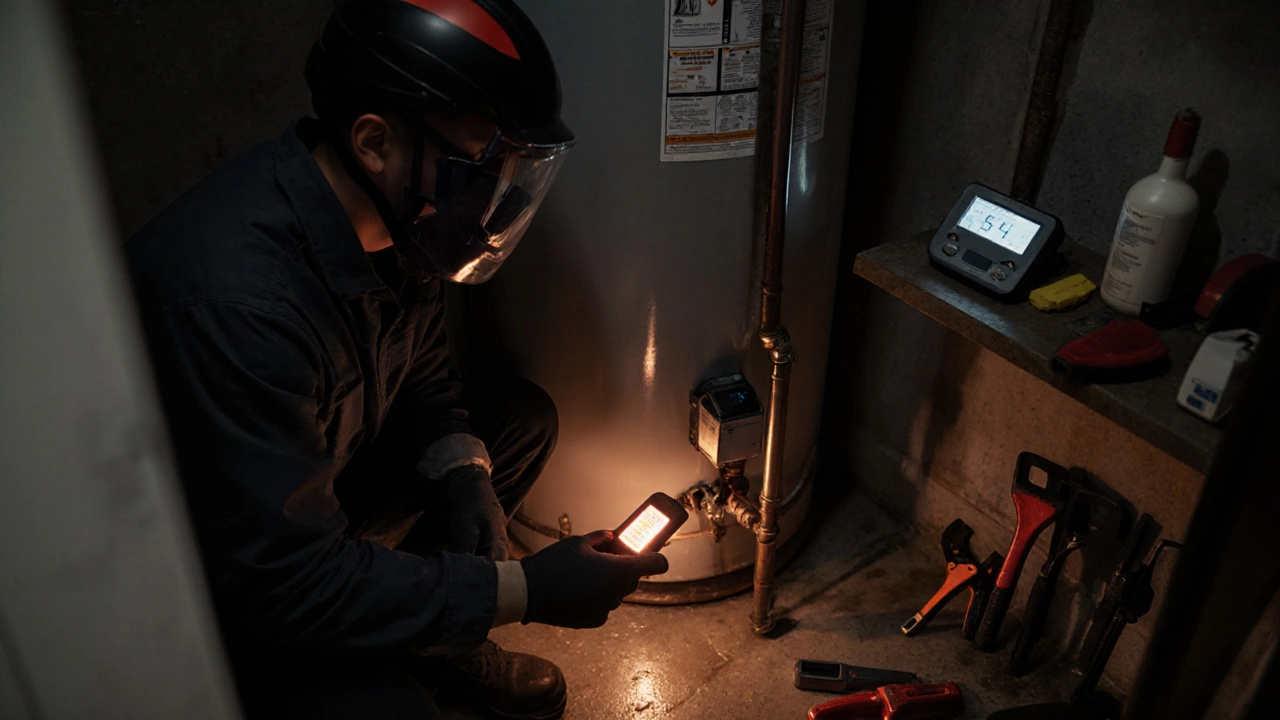
How to Speed Things Up
You can’t control the weather or rusted pipes-but you can control your prep:
- Clear the space-move boxes, towels, or laundry out of the way. Give the plumber room to work.
- Turn off the power-if it’s electric, flip the breaker. If it’s gas, turn the valve off. This saves the plumber time.
- Know your model-look for the brand and serial number on the label. Take a photo. That cuts down on diagnosis time.
- Ask about replacement options-if your heater is over 8 years old, ask if a new unit makes more sense. Some plumbers will push repair to make more money. Don’t be afraid to get a second opinion.
When to Call a Pro (And When to Wait)
Some issues can wait. Others can’t.
Wait: If the water is warm but not hot, or the heater makes a quiet rumbling noise. These are signs of sediment or a weak element. You can usually wait a day or two.
Call now: If you see water pooling around the base, smell gas, or hear a loud bang when the heater turns on. These are safety risks. Don’t risk a leak, fire, or carbon monoxide exposure.
In Auckland, emergency plumbers charge more-but they’re worth it if you’ve got no hot water during a cold snap. Most reputable companies offer same-day service for urgent cases.
How Long Do Water Heaters Last?
Most electric and gas water heaters last 8 to 12 years in New Zealand. Heat pumps last longer-15 to 20 years. But lifespan depends on water quality, maintenance, and usage. If you’ve got hard water, flushing the tank every year can double its life.
Here’s a quick rule: if your heater is over 10 years old and you’re spending more than $300 on repairs, it’s time to replace it. A new 200L electric unit costs between $1,200 and $1,800 installed. A heat pump runs $3,000-$5,000 but cuts your energy bill by 60%.

What’s the Average Cost?
Repair costs vary by job:
- Heating element replacement: $150-$250
- Thermocouple or gas valve: $200-$400
- Full tank replacement: $1,200-$2,500
- Heat pump installation: $3,000-$5,500
Prices in Auckland are 10-15% higher than national averages due to labour costs and transport. Always ask for a written quote before work starts.
What Happens If You Don’t Fix It?
Ignoring a broken water heater doesn’t make it go away. It gets worse.
- Water damage-a leaking tank can rot floorboards, ruin drywall, and grow mould. Repairs cost $2,000+ if it spreads.
- Higher bills-a failing heater works harder, using more power or gas.
- Safety hazards-gas leaks can cause explosions. Electric units can short and spark.
- Insurance issues-some policies won’t cover water damage if the heater was known to be faulty.
Waiting might save you $200 today-but cost you $3,000 next month.
Can I fix my hot water heater myself?
For electric water heaters, you can replace a heating element or thermostat if you’re comfortable with basic wiring and turning off the power. But gas repairs? Never. Gas lines require certification in New Zealand. Even checking the pilot light can be dangerous without the right tools. Most DIY fixes end up costing more when a plumber has to undo your work.
Why is my hot water heater making noise?
Rumbling or popping sounds are usually caused by sediment buildup at the bottom of the tank. As water heats, bubbles form under the sediment and pop loudly. It’s not dangerous, but it reduces efficiency. Flushing the tank once a year removes the sediment and stops the noise. If the noise is sharp or metallic, it could mean a failing element or pressure valve-call a pro.
How do I know if my water heater is too old to repair?
Check the serial number on the label. The first two digits usually show the year it was made. If it’s 10+ years old, repairs are often a waste of money. Signs it’s time to replace: rust on the tank, water pooling around it, inconsistent temperature, or frequent repairs. A new unit will save you money on energy and avoid sudden breakdowns.
Should I switch to a heat pump water heater?
If you’re replacing your heater and use a lot of hot water, a heat pump is worth considering. They use 60-70% less electricity than standard electric tanks. In Auckland’s mild climate, they perform well year-round. The upfront cost is higher-$3,000 to $5,500-but you’ll save $500-$800 a year on power bills. Some local councils offer rebates too.
Do I need a plumber or an electrician for repairs?
For electric water heaters, a licensed plumber can handle most repairs, including electrical components, because they’re trained in both plumbing and electrical safety standards. For gas heaters, you need a plumber with a gas fitting licence. Electricians can’t legally touch gas lines, and plumbers without gas certification can’t touch gas units. Always check their licence before they start work.
What to Do Next
If your water heater’s acting up, don’t panic. Write down the symptoms: cold water? Strange noises? Leaks? Take a photo of the label. Call a local plumber with good reviews. Ask how long the repair will take and if they’ll test for safety issues. Most offer same-day service.
And if you’re thinking about replacing it-start comparing heat pumps and high-efficiency electric tanks now. The sooner you plan, the less likely you’ll be stuck with cold water during a weekend.
